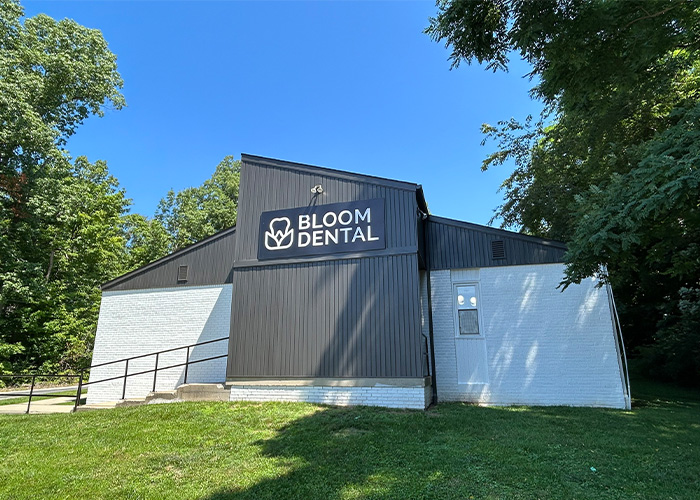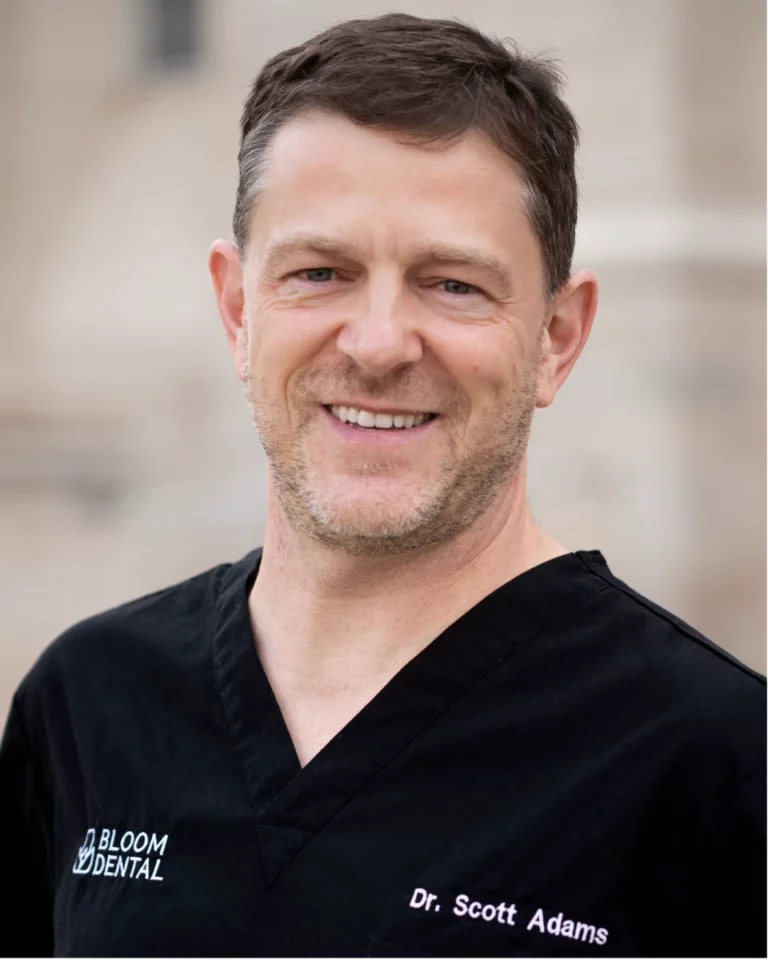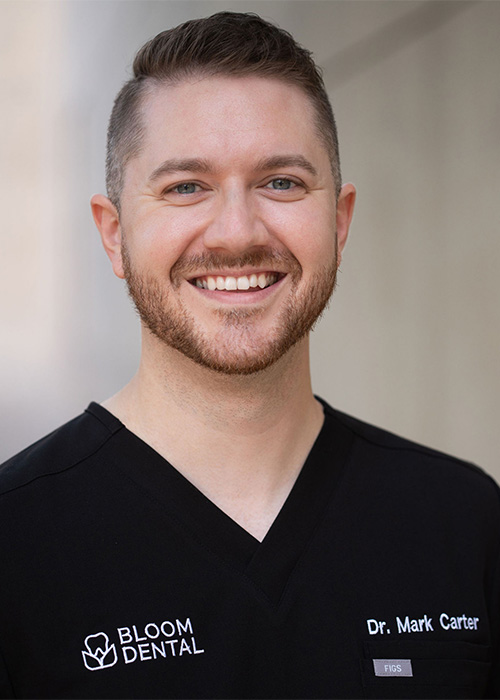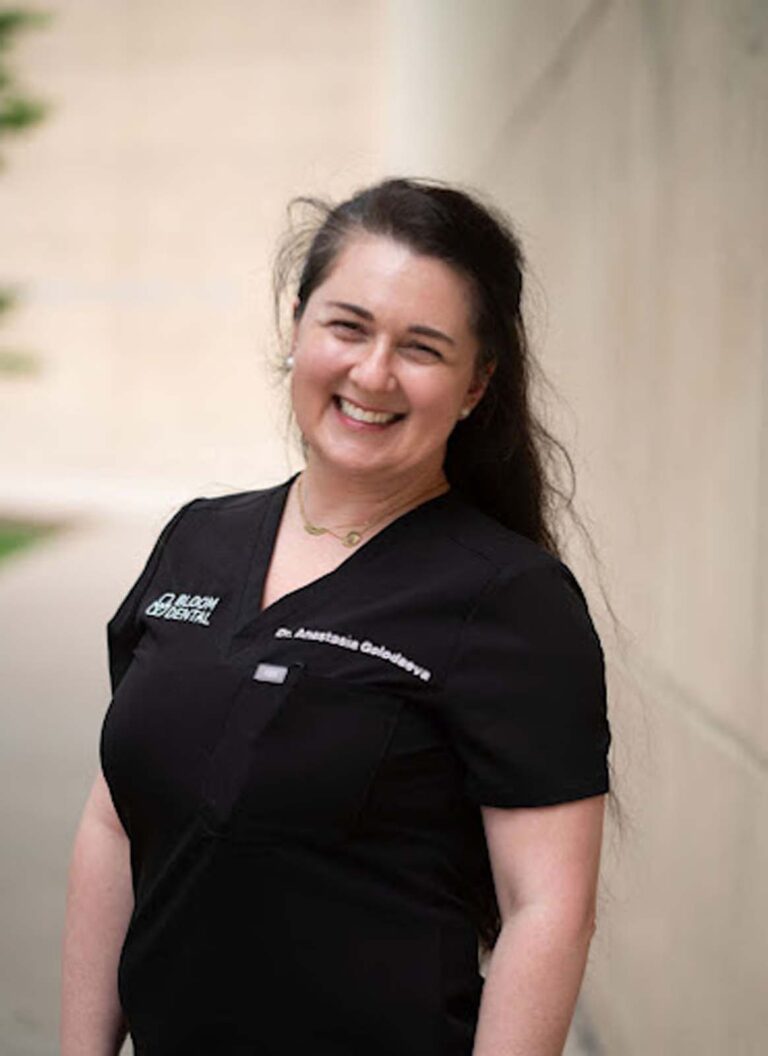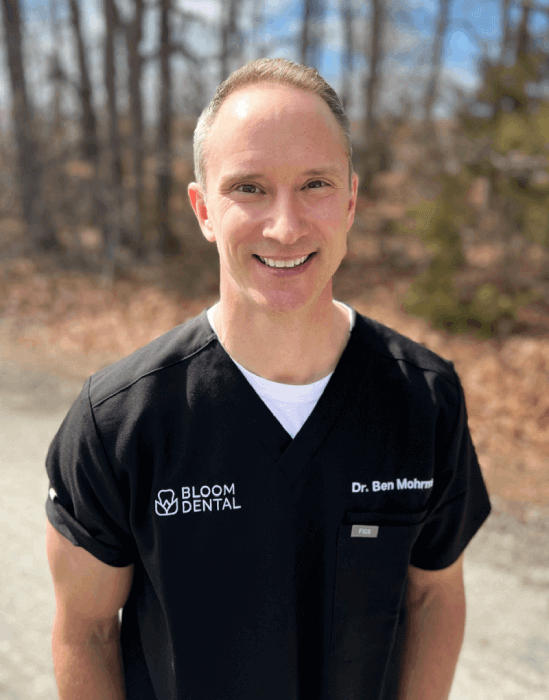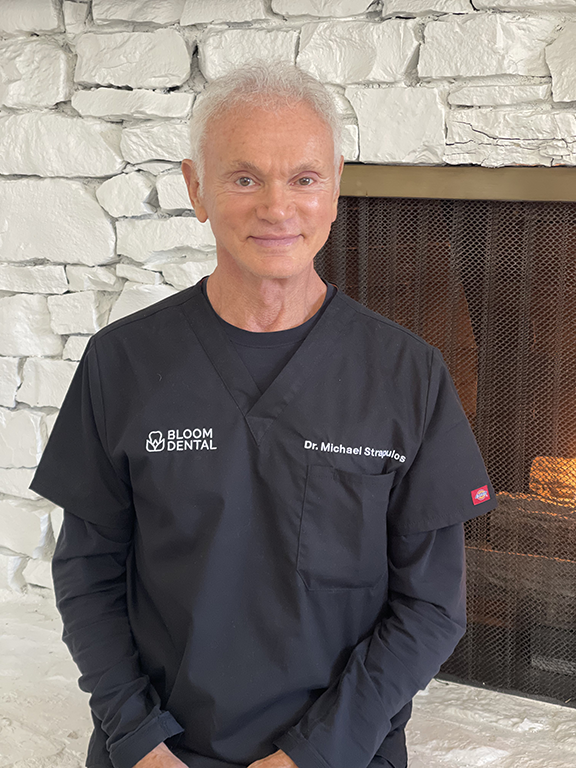Are Dental Implants Safe?
Dental implants have become many dentists’ go-to procedure for replacing missing teeth, and at Bloom Dental, their one of our specialties! Dental implant surgery replaces tooth roots with metal, screwlike posts and replaces damaged or missing teeth with artificial teeth that look and function much like real ones. This surgery is a great alternative to dentures and can offer an option when a lack of natural teeth roots don’t allow building denture or bridgework tooth replacements.
What are the risks?
Like any type of surgery, there are a few risks to getting dental implants. However, the problems that come with dental implant surgery are rare and typically minor, and very treatable. Risks include:
- Sinus problems, when dental implants placed in the upper jaw protrude into one of your sinus cavities
- Injury or damage to surrounding structures, such as other teeth or blood vessels
- Nerve damage, which can cause pain, numbness, or tingling in your natural teeth, gums, lips, or chin
- Infection at the implant site
The advantages of using dental implants.
Dental implants are one of the most reliable dental procedures with a 95% success rate. They also offer advantages that other missing teeth solutions do not, such as:
- Appearance – Implants look and feel like your natural teeth.
- Speech – No need to worry about slipping dentures or loose bridges that can cause slurred speech.
- Comfort – Implants are permanent and stable, so no chaffing or discomfort will happen like with dentures.
- Oral health – Implant placement does not require modifying surrounding teeth as a bridge does. Also, implants stop bone deterioration and stimulate healthy bone tissue growth.
Dental Implant Procedure
When considering having a dental implant procedure, a patient will typically go through the following steps:
- First, the patient will go through a thorough exam and consultation with the dentist. The dentist will then make an individualized treatment plan.
- At the next appointment, the team will place your implant, which acts as a substitute tooth root.
- Then, the tooth is given time (about 2-3 months) to heal and integrate with the bone tissue.
- Once the implant has bonded to the bone tissue, a small connector called an abutment is attached to the implant.
- Impressions are taken of your teeth to create either a custom crown to replace one tooth or an implant-supported bridge or denture for multiple missing teeth. Crown restorations are custom tinted, so they blend in beautifully with your natural teeth.
- The finished crown, bridge, or denture is attached to the implant(s).
Once you get the finished implant, your new teeth are ready to use! If you have any questions or concerns, please reach out to us at our Bloomington office at 812-339-3427 or our Bedford office at 812-275-7975! We want your implants to look and feel like real teeth and your smile to look its best!
What is Biofilm?
The mouth contains a complex microbial ecosystem or system of microbiomes, that can both help and harm teeth. Biofilm, which plaque is an example of, is any collection of microorganisms that cling to each other and to a surface. It’s impossible to completely remove bacteria or eliminate microbiomes from the mouth. However, as in any ecosystem, there is a balance that is necessary to maintain a healthy equilibrium. Good oral hygiene habits, healthy choices, and a balanced diet are our way of maintaining that equilibrium so that more dangerous and harmful bacteria are reduced and kept in check.
Oral Hygiene and Biofilm
If good hygiene habits aren’t maintained then plaque and the microbiome it contains can harden and grow. This can lead to gum disease, tooth decay, and cavities. After oral surgeries in particular there is a risk of infection if good habits aren’t maintained. For this reason, twice daily brushing, regular flossing, and using mouthwash are critical.
Since teeth make up a relatively small part of the overall surface area inside the mouth using an anti-bacterial mouthwash is a great way of fighting back harmful oral bacteria. By regularly brushing you force the biofilm and bacteria in your mouth to regenerate and prevent it from growing out of control.
Diet and Bacteria
Too much sugary food, or improper hygiene after consuming sugary food, can feed bacteria. Sugar is a sort of fuel for certain harmful bacteria present in your mouth. This is why candy, soda, and other sugary foods and drinks are associated with causing cavities. Similarly, too many acidic foods can throw off the oral microbiome and fuel harmful bacteria.
Healthy Choices and the Oral Microbiome
Certain habits and behaviors like smoking or nicotine use can also throw off the oral microbiome. Nicotine usage can cause dry mouth which reduces saliva which naturally helps keep the mouth at equilibrium. Additionally, a thin film can form on teeth from smoking and vaping that can trap excess bacteria. Chewing tobacco similarly can fuel particular types of bacteria.
Regular dental checkups and examinations for more serious issues are also crucial parts of maintaining good overall oral health. At Bloom Dental we are happy to help new clients learn about good oral hygiene. Schedule an appointment or call us today at our Bloomington office at 812-339-3427 or at our Bedford office at 812-275-7975.
Is Water Flossing Better Than String Flossing?
Learn About Water Flossing With us at Bloom Dental
Water flossers or water picks, technically an oral irrigator, if you’re asking, are increasingly popular, but are they effective? Only 32% of adults floss daily, so there is absolutely a need for an easier way to clean between teeth. Going without daily flossing, or some form of interdental cleaning, leaves all of those people, most of us, at serious risk of gum disease. So lets find out if water picks live up to the hype.
Are Water Flossers Better Than String Floss?
Water flossers seem to be very effective according to current research. A 2013 study on the effectiveness of water flossers compared to string floss found that water flossers were “significantly” more effective than string floss. Specifically, they found that after a single use water flossers were 29% more effective at removing plaque. They were particularly better at removing plaque and accumulations from between teeth, and that’s most of why we floss isn’t it?
Something that may be worth considering is that one of the authors of the 2013 study, Deborah Lyle, was employed by the Waterpik corporation from May 2004 until January 2022 as their Director of Clinical Research. Waterpik’s page for clinical research about water flossers lists many studies that include Deborah Lyle as a contributor.
However, other researchers were involved, and other studies exist that point to the effectiveness of water flossers. A 2021 study on the effectiveness of water flossers compared to string floss is an example, though they did not have such strong conclusions as the 2013 Deborah Lyle study did. They found instead that water flossers were just as effective as string floss, not more so. That is why they recommended water flossers to those with braces, retainers or who have fine motor skill issues.
So, water flossers do seem to work and could potentially replace string floss or floss picks in your oral health routine. But are they superior to string floss? They might be, but considering, there doesn’t seem to be a reason to knock yourself if you haven’t hopped on the bandwagon just yet.
Are There Any Downsides to Water Flossers?
While great at cleaning your teeth, there are a few things to consider before you run out and get one. Water flossers can serve as a breeding ground for bacteria, according to a 2021 study. Put simply, because water flosser heads touch your mouth and stay wet, oral bacteria can grow on it. Even in spite of following provided cleaning recommendations. That’s not all, this study limited itself to studying only the nozzle, not the hose or water reservoir itself. So while trying to clean your mouth there is the possibility that you could be spraying your teeth with bacteria.
It’s no secret that tooth brushes can be a source of illness and can serve as a breeding ground for bacteria. However, proper storage and sanitary precautions, even ones as simple as rinsing your tooth brush and letting it dry, have been shown to reduce bacteria considerably. Allowing it to dry is crucial and would be much more time consuming to practice with a water flosser. Because a water flosser is a reservoir of water with an attached hose it seems proper cleaning would require draining it and it’s components and allowing them to dryafter each use, at minimum. Certainly more time consuming than standard care and cleaning instructions have you to think is necessary for proper use.
Besides cleanliness, it’s also worth considering that no one is likely to travel with a water flosser. That just means that you’ll need to keep using string floss for overnight stays. That is to say, even if you get a water flosser, don’t throw out all your old string floss. You’ll still need it if you intend to keep up a daily hygiene routine.
If I Get One, What’s The Best Water Flosser?
The ADA, the American Dental Association, has an approved list of water flossers. The ADA only allows its seal to be used on products which “include data from clinical and/or laboratory studies that demonstrate safety and efficacy according to product category requirements developed by the ADA Council on Scientific Affairs”. The ADA is one of the largest professional organizations for dentists meaning that any product bearing the ADA seal can be reasonably trusted. If you are considering trying a water flosser we strongly encourage you to factor the ADA’s recommendations into your decision.
What Foods Stain Teeth: Common Culprits
Many people wish that their teeth were whiter. One thing that you may not realize is causing your teeth to be discolored is the things that you eat. The foods you eat can actually have a significant effect on the color of your teeth. Join us at Bloom Dental as we dive into some of the most common foods that can stain your teeth.
Coffees & Teas
Tea and coffee are both highly acidic, which can weaken the surface of your teeth, making them more susceptible to staining. Tea and coffee also both contain tannins, which help their coloring stick to your teeth. There is some evidence that having milk in your tea or coffee can help reduce the amount of staining.
Sauces
Dark-colored sauces such as soy sauce, tomato sauce, and curries also cause staining. Switching to lighter or creamy sauces can help mitigate some of the staining.
Fruits & Berries
There are many vibrant fruits that can stain your teeth. Think of the fruits that can stain your clothes – pomegranates, cherries, blueberries, and blackberries just to name a few. In the same way that they can stain your clothes, they can stain your teeth.
Sodas
Sodas are highly acidic thanks to their carbonation. In addition, the dyes in these drinks – including light-colored ones – can cause staining. There are also chemicals in the drink that eat away at your enamel.
How to Mitigate Staining
There are several things you can do to mitigate the effects of food on the color of your teeth. While cutting out the food listed above would be the number one way to reduce their effect, even we enjoy having them so we’ve included things you can do to reduce the staining while still enjoying your favorite foods.
- Use a straw. Using a straw when drinking your favorite beverage helps reduce the amount that the acidity and coloring of the drink come into contact with your teeth.
- Brush after you eat. Brush your teeth about 30 minutes after you eat food that can stain. It’s important to wait a little bit of time to allow the acidity in your mouth to get balanced out so you don’t cause additional damage.
- Rinse your mouth. If you cannot brush your teeth after eating, rinsing your mouth with water can help reduce the acidity of your mouth and remove some of the staining agents from your mouth.
- Visit your dentist. Having regular checkups and teeth cleanings at your dentist is a great way to help your smile stay beautiful.
In addition to providing teeth cleanings, we also proudly offer teeth whitening services in the Bloomington and Bedford, IN areas. Please give our dental office a call at 812-339-3427 or use the link below to schedule an appointment for teeth cleaning or whitening.
Schedule Online Learn About Teeth WhiteningIs Teeth Whitening Safe?
Professional Teeth Whitening in Bloomington and Bedford, IN
Teeth whitening has been around for decades and millions of people use whitening products – including plenty of dentists. According to dental professionals, they haven’t seen an increase in problems like cavity risk or tooth fractures after teeth whitening procedures. Bloom Dental works to provide safe teeth whitening services for our patients in Bloomington.
Side Effects
- Teeth sensitivity: your teeth may become more sensitive after getting them whitened. You may experience this after your first or second treatment, and it can diminish with time. Ask Dr. Finney if he can recommend products for treating sensitivity at your next appointment.
- Irritated gums: you may also experience gingival irritation, which happens when your gums become irritated. If the whitening products touch your gums, then they may become irritated, but Bloom Dental takes precautions to eliminate this risk.
Benefits
- It is safe: the American Dental Association (ADA) has stated that hydrogen peroxide whiteners are safe and effective.
- It is a quick process: you can have whitened teeth in just one session rather than waiting months for at-home products to take into effect.
- It saves time: you don’t have to have your teeth professionally whitened very frequently, in fact, whitening your teeth frequently can actually damage your teeth. With just a couple of sessions of professional whitening, you can achieve the desired color of your smile.
- You don’t have to worry about the safety: we take care of your teeth like they are our own at Bloom Dental. We only provide the safest procedures at our office, the side effects of teeth whitening usually only apply to at-home products that can damage your smile.
If you are worried about your upcoming teeth whitening procedure or worried about an at-home product you are using, you can always ask Dr. Finney if the product is safe. Bloom Dental offers professional teeth whitening that is safe and effective. If you would like to schedule a teeth whitening appointment, use the button below to schedule online, or learn more about teeth whitening at our Bloomington or Bedford, IN offices.
Schedule a Whitening Appointment at Our Bloomington Office
Learn More About Teeth Whitening at Bloom Dental

